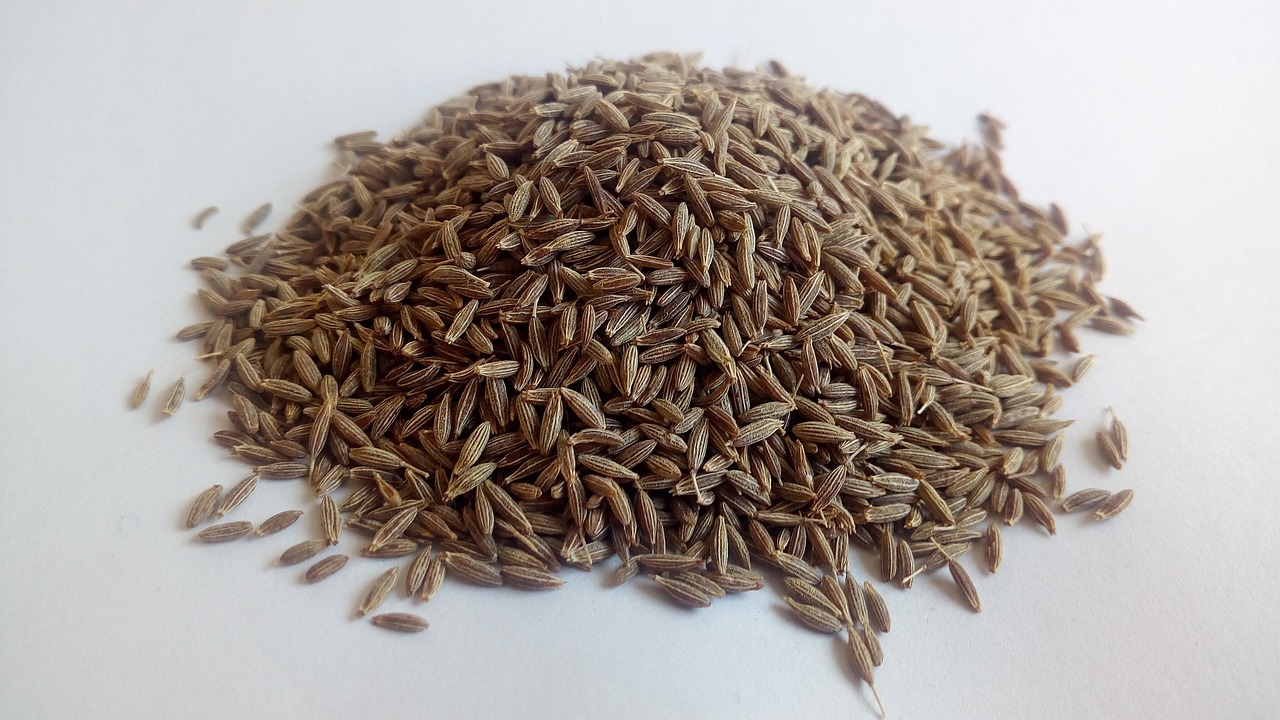
Cumin seeds, known as the “queen of spices,” are small, crescent-shaped seeds with a warm, nutty, and slightly bitter flavor. They are commonly used in cooking and have a long history in traditional medicine. Nutritionally, cumin seeds are rich in essential vitamins such as A, C, E, and several B vitamins, as well as minerals including iron, magnesium, calcium, phosphorus, and manganese. They also contain antioxidants that help combat free radicals, healthy fats, and dietary fiber for digestive health. A tablespoon of cumin seeds has around 22 calories, making them a nutritious and low-calorie dietary addition. Here are some health benefits of cumin seeds.
- Aids digestion and detoxification- Cumin is renowned for its digestive benefits, as it promotes pancreatic enzyme production for better breakdown and absorption of nutrients from carbohydrates, fats, and proteins. Its carminative properties alleviate gas, bloating, and digestive discomfort. Cumin may also help treat irritable bowel syndrome (IBS) symptoms, such as abdominal pain and altered bowel habits. The essential oils in cumin enhance salivary gland activity, aiding digestion from the start. Additionally, cumin supports liver health by promoting bile production, essential for fat breakdown and detoxification. Its antioxidant richness further helps cleanse the body by neutralizing harmful free radicals, benefiting both liver and skin health.
- Supports bone health- Cumin seeds are rich in calcium, magnesium, and phosphorus, which are vital for strong bones and preventing disorders such as osteoporosis. These minerals enhance bone density and support the skeletal system, particularly in older adults. Cumin’s high calcium content is particularly advantageous for women at increased risk of osteoporosis after menopause, as regular consumption can help maintain bone mass and lower the risk of fractures as one ages.
- Improves sleep quality- Cumin seeds may enhance sleep quality due to their calming properties and traditional use as an insomnia remedy. Their high magnesium content can activate sleep-regulating neurotransmitters like GABA. Additionally, cumin helps reduce stress and anxiety, which are often linked to sleep disturbances. Drinking a tea made from cumin seeds before bed can promote relaxation, aiding in faster and longer sleep.
- Improves Lactation- Cumin seeds are beneficial for new mothers as they promote lactation, being recognized as a galactagogue. Their high iron and calcium content supports milk production and the health of both mother and baby. Furthermore, cumin can alleviate digestive issues such as gas and bloating in both mother and infant, making it a valuable part of a nursing mother’s diet.
- Enhances vision- Cumin seeds are high in vitamin A, an antioxidant important for good vision, helping to prevent age-related eye problems like macular degeneration and cataracts. The carotenoids in cumin may enhance overall eye health by reducing oxidative stress and supporting the retina. Moreover, cumin contains zinc, which is essential for proper retinal function and preventing night blindness.
- Relieves Menstrual Cramps- Cumin seeds are traditionally used to relieve menstrual cramps and PMS symptoms due to their anti-inflammatory and muscle-relaxant properties. They help reduce uterine contractions and provide relief from cramps. Additionally, cumin seeds are rich in iron, which is important for women during menstruation to prevent deficiencies. Consuming cumin tea or adding cumin to meals can alleviate discomfort and enhance overall well-being.
- Promotes Oral Health- Cumin seeds are traditionally recognized for promoting oral health due to their antibacterial and antimicrobial properties. They can help with bad breath, gum disease, and toothaches. Chewing cumin seeds or using cumin-infused water as a mouthwash can reduce bacteria, prevent cavities, and freshen breath. Additionally, thymol in cumin stimulates saliva production, aiding in mouth cleaning and lowering the risk of dental issues.
How to use cumin seeds- Incorporating cumin seeds into your diet can enhance dish flavors easily. You can dry roast them to release their oils and use them to season vegetables, meats, and legumes. Ground cumin is versatile for sprinkling on salads, soups, and stir-fries. Additionally, boiling cumin seeds in water creates a soothing tea that aids digestion and alleviates bloating. Cumin can also enhance spice blends like garam masala or taco seasoning and can be added to the dough for homemade bread, crackers, or flatbreads to provide crunch and flavor.
Precautions- Cumin seeds provide various health benefits, but excessive intake can cause side effects. These include heartburn, particularly for those prone to acid reflux, low blood sugar levels in diabetics due to cumin’s hypoglycemic effect, and potential liver damage from overconsumption of cumin oil or supplements. It’s essential to adhere to recommended dosages and consult a healthcare professional before using cumin supplements.
-Triparna







